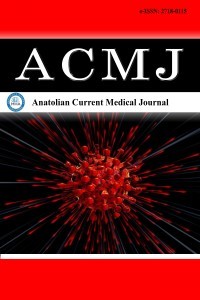1.
Lean SC, Derricott H, Jones RL, Heazell AEP. Advanced maternal age and adverse pregnancy outcomes: a systematic review and meta-analysis. PloS One. 2017;12(10):e0186287. doi:10.1371/journal.pone.0186287
2.
Shan D, Qiu PY, Wu YX, et al. Pregnancy outcomes in women of advanced maternal age: a retrospective cohort study from China. Sci Rep. 2018;8(1):12239. doi:10.1038/s41598-018-29889-3
3.
Balasch J, Gratacos E. Delayed childbearing. Curr Opin Obstet Gynecol. 2012;24(3):187-193. doi:10.1097/GCO.0b013e3283517908
4.
Khalil A, Syngelaki A, Maiz N, Zinevich Y, Nicolaides KH. Maternalage and adverse pregnancy outcome: a cohort study. Ultrasound Obstet Gynecol. 2013;42(6):634-643. doi:10.1002/uog.12494
5.
Schimmel MS, Bromiker R, Hammerman C, et al. The effects ofmaternal age and parity on maternal and neonatal outcome. Arch Gynecol Obstet. 2015;291(4):793-798. doi:10.1007/s00404-014-3469-0
6.
Wang Y, Tanbo T, Abyholm T, Henriksen T. The impact of advanced maternal age and parity on obstetric and perinatal outcomes in singleton gestations. Arch Gynecol Obstet. 2011;284(1):31-37. doi:10.1007/s00404-010-1587-x
7.
Yogev Y, Melamed N, Bardin R, Tenenbaum-Gavish K, Ben-Shitrit G, Ben-Haroush A. Pregnancy outcome at extremely advanced maternal age. Am J Obstet Gynecol. 2010;203(6):558.e1-558.e5587. doi:10.1016/j.ajog.2010.07.039
8.
Kanungo J, James A, McMillan D, et al. Advanced maternal age and the outcomes of preterm neonates: a social paradox? Obstet Gynecol. 2011; 118(4):872-877. doi:10.1097/AOG.0b013e31822add60
9.
Cohen W. Does maternal age affect pregnancy outcome? BJOG. 2014; 121(3):252-254. doi:10.1111/1471-0528.12563
10.
Julious SA. Sample sizes for clinical trials. chapman and hall/CRC. 2023
11.
Kulhan M, Kulhan NG, Naykı Ü, Naykı C, Uluğ P, Ata N. Erzincandaki ileri anne yaşı gebeliklerinin retrospektif analizi. Van Tıp Derg. 2017; 24(4):272-278. doi:10.5505/vtd.2017.83007
12.
ACOG Practice Bulletin. Gestational hypertension and preeclampsia. Obstet Gynecol. 2019;133(1):1. doi:10.1097/AOG.0000000000003018
13.
Metzger BE, Gabbe SG, Persson B, et al. International association of diabetes and pregnancy study groups recommendations on the diagnosis and classification of hyperglycemia in pregnancy. Diabetes Care. 2010;33(3):676-682. doi:10.2337/dc10-0719
14.
Bruno RM, Masi S, Taddei M, Taddei S, Virdis A. Essential hypertension and functional microvascular ageing. High Blood Press Cardiovasc Prev. 2018;25(1):35-40. doi:10.1007/s40292-017-0245-9
15.
Timofeev J, Reddy UM, Huang C, Driggers RW, Landy HJ, Laughon SK. Obstetric complications, neonatal morbidity, and indications for cesarean delivery by maternal age. Obstet Gynecol. 2013;122(6):1184-1195. doi:10.1097/AOG.0000000000000017
16.
Cleary-Goldman J, Malone FD, Vidaver J, et al. Impact of maternal age on obstetric outcome. Obstet Gynecol. 2005;105(5 Pt 1):983-990. doi:10. 1097/01.AOG.0000158118.75532.51
17.
Cakmak Celik F, Aygun C, Kucukoduk S, Bek Y. Maternal and neonatal outcomes in advanced maternal age: a retrospective cohort study. J Matern Fetal Neonatal Med. 2017;30(20):2452-2456. doi:10.1080/ 14767058.2016.1253058
18.
Sheen JJ, Wright JD, Goffman D, et al. Maternal age and risk for adverse outcomes. Am J Obstet Gynecol. 2018;219(4):390.e1e390.e15. doi:10.1016/ j.ajog.2018.08.034
19.
Kramer MS, Berg C, Abenhaim H, et al. Incidence, risk factors, and temporal trends in severe postpartum haemorrhage. Am J Obstet Gynecol. 2013;209(5):449.e1-449.e7. doi:10.1016/j.ajog.2013.07.007
20.
Durmaz A, Komurcu N. Relationship between maternal characteristics and postpartum hemorrhage: a meta-analysis study. J Nurs Res. 2018; 26(5):362-372. doi:10.1097/jnr.0000000000000245
21.
Lao TT, Sahota DS, Cheng YK, Law LW, Leung TY. Advanced maternal age and postpartum hemorrhage-risk factor or red herring? J Matern Fetal Neonatal Med. 2014;27(3):243-246. doi:10.3109/14767058.2013.807240
22.
Grotegut CA, Paglia MJ, Johnson LNC, Thames B, James AH. Oxytocin exposure during labor among women with postpartum hemorrhage secondary to uterine atony. Am J Obstet Gynecol. 2011;204(1):56.e1-56.e566. doi:10.1016/j.ajog.2010.08.023
23.
Kelly R, Holzman C, Senagore P, et al. Placental vascular pathology findings and pathways to preterm delivery. Am J Epidemiol. 2009;170(2): 148-158. doi:10.1093/aje/kwp131
24.
Norwitz ER, Caughey AB. Progesterone supplementation and the prevention of preterm birth. Rev Obstet Gynecol. 2011;4(2):60-72. doi:10. 3909/riog0163
25.
Lu L, Li JH, Dai XF, Wei JB, Chen LH, Hu JF. Impact of advanced maternal age on maternal and neonatal outcomes in preterm birth. Ginekol Pol. 2022;93(2):134-141. doi:10.5603/GP.a2021.0224
26.
Waldenström U, Cnattingius S, Vixner L, Norman M. Advanced maternal age increases the risk of very preterm birth, irrespective of parity: a population-based register study. BJOG. 2017;124(8):1235-1244. doi:10.1111/1471-0528.14368
27.
Iman AEH, Huniadi A, Sandor M, Zaha IA, Rotar I, Iuhas C. Prevalence and risk factors of gestational diabetes mellitus in Romania: maternal and fetal outcomes.Medicina. 2025;61(2):194. doi:10.3390/medicina 61020194
28.
Karlstrom A, Lindgren H, Hildingsson I. Maternal and infant outcome after caesarean section without recorded medical indication: findings from a Swedish case-control study. BJOG. 2013;120(4):479-486. doi:10. 1111/1471-0528.12129
29.
Pawde AA, Kulkarni MP, Unni J. Pregnancy in women aged 35 years and above: a prospective observational study. J Obstet Gynaecol India. 2015;65(2):93-96. doi:10.1007/s13224-014-0616-2
30.
Usta IM, Nassar AH. Advanced maternal age. Part I: obstetric complications. Am J Perinatol. 2008;25(8):521-534. doi:10.1055/s-0028- 1085620
31.
Biro MA, Davey MA, Carolan M, Kealy M. Advanced maternal age and obstetric morbidity for women giving birth in Victoria, Australia: a population-based study. Aust N Z J Obstet Gynaecol. 2012;52(3):229-234. doi:10.1111/j.1479-828X.2012.01427.x
32.
Roustaei Z, Vehvil€ainen-Julkunen K, Tuomainen TP, Lamminpää R, Heinonen S. The effect of advanced maternal age on maternal and neonatal outcomes of placenta previa: a register-based cohort study. Eur J Obstet Gynecol Reprod Biol. 2018;227:1-7. doi:10.1016/j.ejogrb.2018. 05.025
33.
Jahromi BN, Husseini Z. Pregnancy outcome at maternal age 40 and older. Taiwan J Obstet Gynecol. 2008;47(3):318-321. doi:10.1016/S1028-4559(08)60131-X

